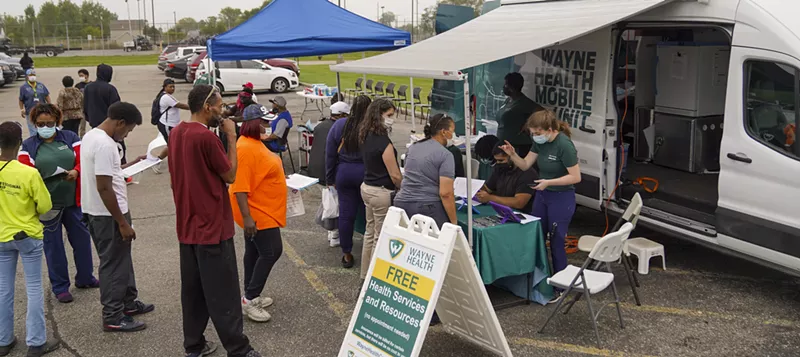
Wayne Health
Wayne Health Mobile Units have administered more than 14,000 doses of the COVID-19 vaccine.
An analysis of mobile health clinics launched in the Detroit metro area during the pandemic finds it’s a model that can deliver health screenings and health care and could be replicated in other communities.
The Wayne Health Mobile Units are specially equipped vans with medical equipment and professionals. They began as testing sites for front-line workers in the early days of COVID-19, out of a partnership between Wayne State University and Ford Motor Co. Over time, they transitioned to what Dr. Phillip Levy, a professor of emergency medicine and assistant vice president for translational science and clinical research innovation at Wayne state and chief innovation officer for Wayne State University Physician Group, called a “vision of patient-centric, portable population health.”
“If they have comorbidities and need doctors’ appointments or health care,” said Levy, who runs the program, “can we provide linkages around that? If they have food insecurity, can we help them get food access, so that we can really be delivering on the holistic approaches that are needed in order to keep this person healthy and avoid complications?”
Levy noted they have a Patient Portal for folks to register online, but appointments are not necessary, and they don’t require insurance or identification — which can be barriers to care. He added that bringing care into communities also reduces the barriers of transportation time and cost.
Beyond testing and treatment for COVID, Levy said the Mobile Health Units do blood screenings for high cholesterol, diabetes, and kidney disease and provide prevention infrastructure — as well as blood pressure screenings for hypertension. He said they also are building out HIV screening and treatment, and have started working with the state’s needle-exchange program.
“Can we use these vehicles to reach vulnerable communities of IV drug users,” he said, “not to distribute needles alone, but to test for HIV and hepatitis C and B, and provide medical linkages to care?”
Levy pointed out that 40% to 50% of the people who visit the Mobile Health Units come from areas where the social vulnerability index is extremely high. For other communities looking to replicate the program, he said building trust over time is important, and can be done with the help of faith groups and community-based organizations.
“Communities know that when the Wayne Health vans come, they’re not coming for one time, they’re going to be there, maybe for several days in a row,” he said. “But we’re going to be back over and over again, providing these resources to community members.”
Stay connected with Detroit Metro Times. Subscribe to our newsletters, and follow us on Google News, Apple News, Twitter, Facebook, Instagram, Reddit, or TikTok.

